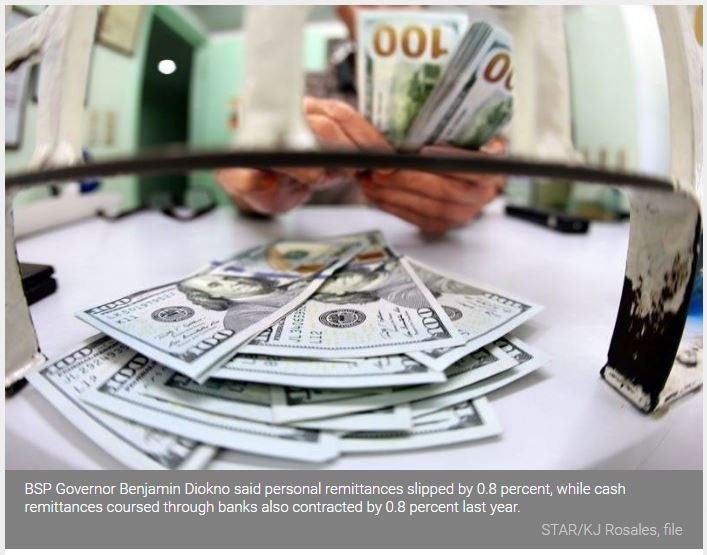Philippines: Remittances resilient, shrink just below 1%
MANILA, Philippines — Remittances shrank by just less than one percent last year despite the displacement of close to half a million overseas Filipino workers (OFWs) due to the global health crisis, the Bangko Sentral ng Pilipinas (BSP) said.
BSP Governor Benjamin Diokno said personal remittances slipped by 0.8 percent, while cash remittances coursed through banks also contracted by 0.8 percent last year.
This was way lower than the revised projection of a two percent contraction for 2020, but still ended 19 consecutive years of growth.
OFW remittances last contracted to $6.03 billion in 2001 from $6.05 billion in 2000 primarily due to the Asian financial crisis and the political controversies during the Estrada administration.
“The actual decline in 2020 was, however, lower than the earlier forecast contraction of two percent for the year,” Diokno said.
He said personal remittances reached $33.19 billion in 2020 or $273 million lower than the record level of $33.47 billion in 2019.
“Nonetheless, personal remittances remained a major source of the country’s foreign exchange inflows,” Diokno said.
The BSP chief pointed out that personal remittances accounted for 9.2 percent of gross domestic product (GDP) and 8.5 percent of gross national income (GNI) last year.
Likewise, Diok-no reported that cash remittances amounted to $29.9 billion last year or $230 million lower than the all-time high of $30.13 billion booked in 2019.
Remittances from Saudi Arabia, Japan, the UK, United Arab Emirates, Germany and Kuwait declined, while those from the US, Singapore, Canada, Hong Kong, Qatar, South Korea and Taiwan increased.
Data showed the US still accounted for the biggest share at 39.9 percent, followed by Singapore, Saudi Arabia, Japan, UK, United Arab Emirates, Canada, Hong Kong and South Korea.
“These countries accounted for 78.6 percent of the total cash remittances,” Diokno said.
Ironically, both personal and cash remittances slipped last December despite the Christmas and New Year holidays.
For the month of December alone, personal remittances declined by 0.3 percent to $3.2 billion in December from $3.21 billion in the same month in 2019, while cash remittances slipped by 0.4 percent to $2.89 billion.
Despite the decline, personal remittances booked its highest level since the $3.22 billion recorded in December 2019, while that of cash remittances was the biggest since the $2.9 billion booked in December 2019.
Nicholas Mapa, senior economist at ING Bank Manila, said remittance flows bucked the general expectation for a substantial contraction in 2020, with OFWs managing to send home much-needed funds despite the challenges faced on the economic and health fronts.
“Despite lockdowns, threats to health, the shutdown of the cruise line industry and repatriation due to widespread job losses abroad, remittances fell by only 0.8 percent with OFWs finding a way to send home much-needed funds to help support their loved ones,” Mapa said.
In peso terms, remittances have actually contracted by 4.8 percent as the local currency strengthened by more than five percent despite OFWs struggling to find a way to send home more dollars to pay for fixed peso expenditures such as tuition or mortgage payments.
Mapa said the remittance safety valve is further challenged with up to 420,000 OFWs repatriated due to job losses in their host countries, cutting off the steady stream of about $500 sent home by each OFW to their families monthly.
Michael Ricafort, chief economist at Rizal Commercial Banking Corp., said remittances would continue to contract in early 2021 until some of the repatriated OFWs regain their jobs that they lost in the same or in another host country.
Ricafort cited the importance of the successful rollout of COVID-19 vaccines that could further improve economic recovery prospects leading to more job opportunities for OFWs.
The BSP sees OFW remittances bouncing back with a four percent growth this year.
Source: https://www.philstar.com/business/2021/02/16/2077966/remittances-resilient-shrink-just-below-1


 English
English




